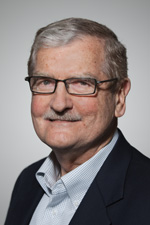Prof. G. Scott Samuelsen

Professor of Mechanical, Aerospace, and Environmental Engineering at the University of California Irvine, Founding Director of the Advanced Power and Energy Program (APEP), the National Fuel Cell Research Center (NFCRC), and the UCI Combustion Laboratory (UCICL).
In addition to the Department of Mechanical and Aerospace Engineering, Professor Samuelsen holds a joint appointment in the Department of Civil and Environmental Engineering and the Institute of Transportation Studies. He received his M.S. and Ph.D. in Mechanical Engineering from the University of California, Berkeley.
Professor Samuelsen brings to the ORU his expertise in power generation, from fossil fuel combustion to fuel cell technology, and the climate and air quality impacts associated with the generation, distribution, dispensing, and utilization of traditional and emerging renewable fuels.
Overall, Professor Samuelsen’s research is directed to increasing the efficiency of energy systems and mitigating the impacts of energy systems on urban air quality and the climate with a focus on gas turbine combustion, fuel cell technology and fuel cell systems, microgrid and smart grid technology, the hydrogen and electricity infrastructure for the evolving generation of a zero-emission grid and zero-emission mobility, the merging of the grid with mobility, and connected and autonomous vehicles.
Professor Samuelsen pioneered the development of octane posting with the Federal Trade Commission and is responsible for the popular (R+M)/2 posting methodology that anchors today both engine design and fuel formulation. He has led pioneering research in the development, field demonstration, and commercialization of fuel cell/gas turbine hybrid systems, fuel cell tri-generation technology, lean-burn gas turbine technology, microgrid control, plug-in fuel cell electric vehicles, hydrogen fueling infrastructure, and electric vehicle-to-home electricity transfer. He has published over 300 peer reviewed archival publications and conference proceedings and was recognized by President Obama in 2011 as a “Champion of Change.” In 2010, he received the UCI Medal for his contributions to energy and the environment.
- energy systems with a focus on gas turbine combustion
- fuel cell technology and fuel cell systems
- microgrid and smart grid technology
- hydrogen and electricity infrastructure

